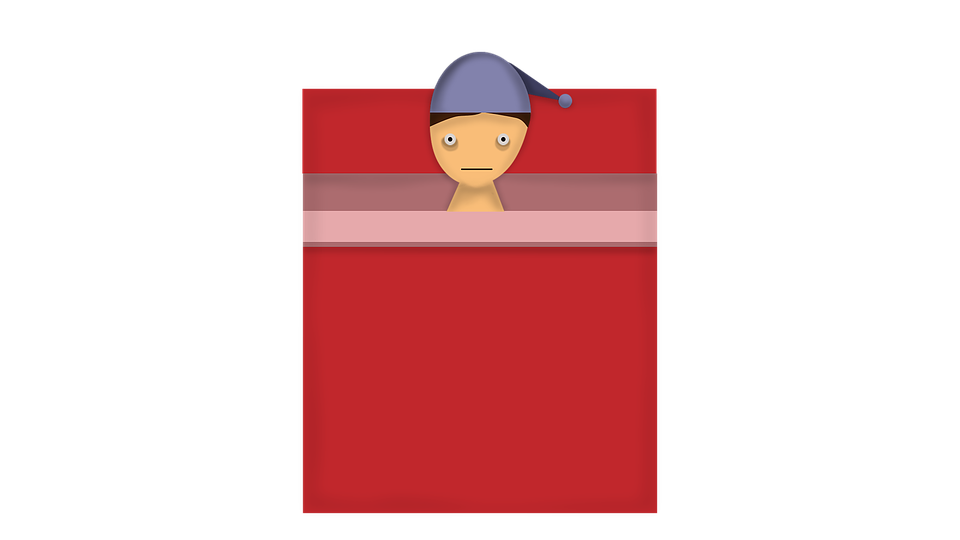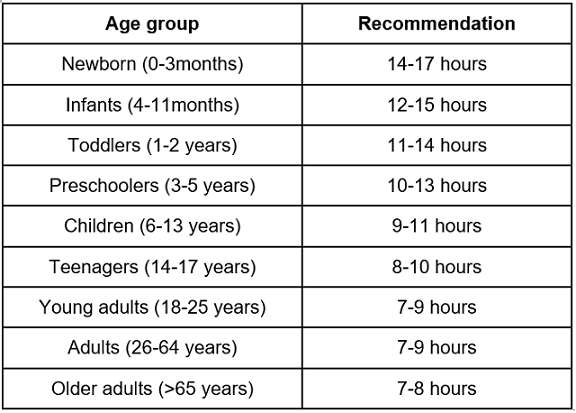
1) What is insomnia?
Insomnia is simply put, trouble sleeping. Some people may have problems falling asleep, and some may have problems staying asleep (such as waking up in the middle of the night).
Most adults fall asleep within 10-20 minutes of trying to sleep and spend less than 30 minutes awake during the night. In contrast, a person with insomnia usually reports taking 30 minutes or more to fall asleep, or spend 30 minutes or more awake during the night.
However, the average duration of sleep does change with age, which is why the recommended sleep time differs according to one’s age. These are the recommended sleep time according to the USA national sleep foundation:

Understandably, because of the variation between individuals, some people may sleep less than the recommended duration of sleep without negatively affecting their health or bodily functions. Generally, a diagnosis of insomnia (sleep) disorder is only made if a person has sleep difficulties that affect their daytime function, such as:
- Excessive tiredness, fatigue
- Poor attention or concentration
- Affecting performance in school, work or socially
- Mood disturbance such as being very irritable
- Daytime sleepiness
- Lack of motivation and energy
- Increased mistakes or accidents
- Ongoing worry about sleep
3) What causes insomnia?
There are many causes!
As discussed above, some people may just sleep for a short period of time, but have no daytime symptoms and are otherwise well. We call them ‘short-sleepers’, and they do not have insomnia.
Causes of short-term insomnia (less than 3 months):
Short term insomnia is usually stress-related. These tend to resolve when the stressors resolve. Possible stressors may include:
-Changes in the sleeping environment (temperature, light, noise)
-Working too hard
-Loss of a loved one, relationship, or job loss
-Recent illness, surgery or sources of pain
-Use or withdrawal from medications or substances such as caffeine, alcohol, energy drinks or certain prescription or medications
In addition, changes in your normal cycle can also cause insomnia. These include situations such as jet lag, or working shift work.
Causes of long-term insomnia (more than 3 months):
This can be what is called ‘primary insomnia’, which is insomnia that occurs on its own, without association with any other conditions. This can begin in childhood or be passed along in families.
However, long-term insomnia commonly occurs with other conditions, such as:
-Mental health problems, such as depression and anxiety disorders
-Medical illnesses, especially those that are associated with pain, stress or difficulty breathing
-Neurological problems
-Other sleep disorders such as restless leg syndrome
4) How is insomnia treated?
Generally, if the sleeping problem occurs in association with another problem, such as mental health conditions, stress, pain or other medical conditions, treatment of the underlying problem may help to improve sleep.
Behavioural factors and sleep-related habits do affect our sleep. Good sleeping habits (also known as good ‘sleep hygiene’) go a long way to help us sleep better. These methods are effective at improving our sleep, but the benefit may not be evident immediately. Therefore, consistency and perseverance with the behavioural changes are key. Behavioural changes are recommended for everyone suffering from insomnia, and include:
-Maintaining a regular sleep schedule (sleep and wake up at the same time each day)
-Limiting consumption of coffee or other caffeinated consumed, especially after lunchtime
-Appropriate bedroom environment (dim light, minimal noise, cooling temperature)
-Avoid alcohol, especially in the 4-6 hours before bedtime
-Avoid taking naps during the day
-Regular exercise (but avoid strenuous exercise in the 4 hours before bedtime)
-If possible, only use the bedroom for sleep, so that your body learns to associate the bedroom with sleeping
-Avoid staying awake in bed if you can not fall asleep. If you lie awake in bed for more than 15-20 minutes, get up, go out of the bedroom, and do some light activity (such as reading, tidying) until you feel sleepy again. Return to bed only when you feel sleepy, and if you do not fall asleep in 15-20 minutes, repeat this process over again
-Avoid stimulating activities or exposure to bright lights (such as your smartphone, computer monitors or the television) at bedtime. These devices emit blue light, which the body can confuse for sunlight, and this could disrupt our normal sleep-wake cycle.
Again, these methods may not lead to an immediate improvement in sleep, but if employed consistently, will definitely help with sleep in the coming days to weeks.
5) Are there medications for insomnia?
There are medications that can help with sleep. The most commonly used medications for sleep are called benzodiazepines, or benzodiazepine-like medications. In general, these ‘sleeping pills’ are quite effective in helping people sleep when they are first used. However, over time, these medications become less and less effective (this is called ‘tolerance’), and are associated with addiction (‘dependence’). Dependence means that people who use these medications regularly will experience withdrawal effects when the medication use is reduced or stopped. Put together, there is a danger of needing higher and higher doses of the ‘sleeping pill’, and it can be hard to stop using the medication with regular long-term use.
Nevertheless, there are circumstances where these medications may be useful, but they should only be used as prescribed by your doctor. In most cases, only short-term use of these medications (days to weeks) is advisable.






Leave a Reply